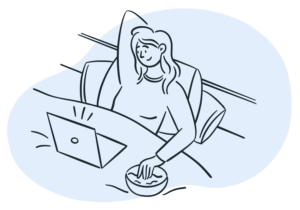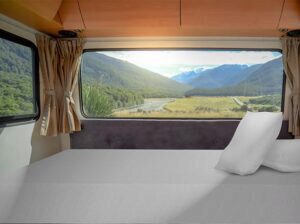Sleep and Camping
Disclosure: By clicking on the product links in this article, Mattress Nerd may receive a commission fee at no cost to you, the reader. Read full disclosure statement.
You don’t have to be a rocket scientist to realize the benefits of being outdoors. Studies have shown that just two hours in nature can greatly improve your sense of health and wellbeing. But did you know spending the night outside can actually reset your biological clock and improve your sleep? Read on and see how a simple weekend camping trip can vastly benefit your sleep and, in turn, your overall health.

Is Camping Beneficial for Sleep?
A weeklong camping trip is a wonderful way to get a little exercise and connect with nature. It also exposes you to natural light and darkness, which can have a profound impact on your circadian rhythm and help you fall asleep, University of Colorado Integrative Physiology Professor Kenneth Wright found. A weekend camping trip in the winter can have an even more profound effect, according to a follow-up study published in the journal Current Biology.
What is the circadian rhythm?
The circadian rhythm is our body’s internal clock that regulates our sleep-wake patterns over a 24-hour cycle. This clock is operated by a group of neurons in the brain called the suprachiasmatic nucleus, which takes cues our body sends when it senses changes in the environment. For example, when we see the sun setting and dusk gathering, sensors in our eyes send a message to the suprachiasmatic nucleus which triggers the production of melatonin, the so-called sleep hormone.
For the most part, the circadian rhythm works like clockwork, enabling us to fall asleep at night and wake in the morning. But sometimes our circadian rhythm gets out of synch, for example, when we travel by air over time zones and experience jet lag. But there are more subtle ways our sleep-wake schedules can be disturbed. Researchers have found that reduced exposure to daytime sunlight and increased exposure to electrical lighting at night can lead to late circadian and sleep timing. Having an out-of-synch sleep-wake cycle may lead to a sleep deficit, which can put you at an increased risk of heart disease, kidney disease, high blood pressure, diabetes, and stroke, as well as mood disorders and accidents.
But a good dose of natural sunlight can do wonders. “What’s remarkable is how, when we’re exposed to natural sunlight, our clocks perfectly become in sync in less than a week to the solar day,” said lead researcher Wright, who also serves as director of CU-Boulder’s Sleep and Chronobiology Laboratory. He monitored eight participants as they went about their daily lives while wearing wrist monitors that recorded the intensity of light they were exposed to, the timing of that light, and their activity.
The findings
After a week, Wright recorded participants’ circadian clocks by measuring their level of melatonin. The second week, the participants went camping in Colorado’s Eagles Nest Wilderness where they were exposed only to sunlight and the light emanating from campfires. No flashlights or electronic devices were allowed. After the second week, Wright observed that participants’ bedtimes began to sync with sunset and sunrise, kicking in about two hours earlier than before.
In a follow-up study four years later, Wright recruited five new volunteers to camp for one week in the Colorado Rockies. He found campers’ biological nights shifted more than 2.5 hours earlier, but they did not wake earlier. Instead, they slept longer adapting to the longer hours of darkness seen in winter.
Camping outdoors has obvious benefits. But let’s face it: Sleeping bags and tents hardly compare in comfort to our cozy mattresses and temperature-controlled bedrooms at home. Don’t despair. We’ll explain ways you can make your camping environment more conducive to sleep.
How to Sleep Better While Camping
Sleeping in a new environment can take some adjusting, especially if that environment happens to be outdoors. Let’s take a look at some things that may interfere with your comfort and strategies you can use to make your camping excursion comfortable:
Get Comfortable
You don’t have to sacrifice your comfort to spend some quality time in the great outdoors. Here are a few tips and tricks to stay comfortable no matter what Mother Nature throws your way.
Location
Established campgrounds provide many amenities for campers including designated spaces for tents, tables, fire pits, as well as restrooms, electrical hookups, and water. Whether you’re going primitive or glamping in a luxury RV, here are some location tips to keep in mind:
- Level ground: Whether you’re pitching a tent, popping up a camper, or backing in an RV, it is crucial that your sleep site is on level ground. Otherwise, you may wake up wedged in the corner of your tent or camper.
When parking an RV or camper, if possible try to have someone stand outside of the car to help find the most level surface and get the vehicle in at the right angle.
- Ground surface: For tents and open-air sleepers, ground surface is key. You’ll want to steer clear of sharp protrusions that might stab you awake if you roll over onto them during the night. Patches of grass or sand are some of the best options. It’s also best to sleep on an elevated surface if possible. For example, if you pitch your tent at the bottom of a hill and it rains, all of the water is going to rush down the hill and flood your tent, even if you’re not near a lake or stream. Try to pitch your tent at the highest point in your campground.
- Protection from the elements: One of the best ways to sync your circadian rhythm with the sunrise and sunset is to pitch your tent or park your camper under the open sky. But if you want to sleep in, look for a shady spot that blocks the morning sun. Likewise, if you’re in a windy environment, setting up camp next to boulders can help break heavy wind gusts. Also, be mindful of possible flooding areas if camping near water.
- Proximity to bathroom facilities: If you’re prone to middle-of-the-night bathroom breaks, you might prefer a campsite close to the potty. If you’re opting for a more primitive camping experience, be sure to scope out your bathroom spot before heading to bed.
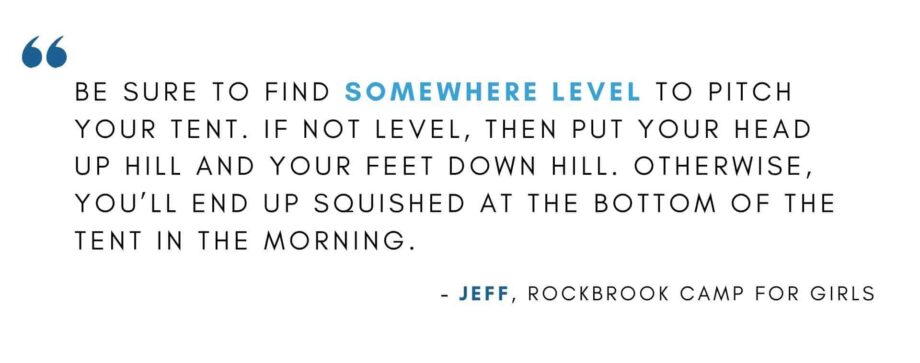
Adequate space
If you opt against camping in a designated space provided by a campground, you’ll want to follow the rule of 200 feet, the Washington Trails Association advises. In other words, set up your camp so that your sleep space, trail, water, food storage, dishwashing, and toilet are all 200 feet apart. Regardless if you are sleeping in a tent, camper, or RV, if you’re sharing your sleep quarters you want to make sure each of you has plenty of room. If you’re too cramped, consider pitching additional tents or bringing along more campers.
Equipment to help you sleep
There are plenty of products available that can help make your sleep while camping more comfortable. Let’s take a look at a few:
- Sleeping bag: There are four main styles of sleeping bags —mummy-style, rectangular, semi-rectangular, and double bags. These can fall into three basic temperature ratings — summer, three-season, and winter.
- Mummy-style sleeping bags resemble an Egyptian mummy that when fully closed only exposes the nose and mouth of the sleeper. These bags are more form-fitting and thus can feel more restrictive. But they are more insulating and best for cold nights.
- Rectangular sleeping bags are a more traditional style that offers more freedom of movement. These bags are less insulating and best for temperatures above freezing.
- Semi-rectangular sleeping bags are tapered from the top to the bottom. They provide more warmth than traditional sleeping bags but are less restrictive than mummy-style bags.
- Double bags, as the name implies, are sleeping bags made for two. You can also zip two rectangular bags together to make your own double bag.
- Summer bags are good for climates down to 30 degrees and have full zippers that allow you to open up for ventilation if you get too hot. They are also lighter weight and can pack down to the size of a small melon, making them easy to carry around if you’re hiking.
- Three-season bags can be used in temperatures down to 20 degrees and are typically best for 15 to 30 degrees. These bags are ideal for spring or fall excursions, or summertime mountaintop trips where the temperatures dip below freezing at night. These bags have added features like hoods and draft collars and zipper draft tubes.
- Winter bags are best for nights that dip below 15 to 20 degrees and include cinchable hoods, draft collars, and zipper draft tubes like three-season bags, but with more insulation to keep you warm in deep cold. But, they’re also bulkier and harder to lug around.
- Mattress pad: Mattress pads can be game-changers when it comes to sleeping outdoors. They provide both cushioning as well as insulation to keep you warm throughout the night. There are three basic types of pads — air, closed-cell foam, and self-insulating:
- Air pads are comfortable, lightweight, air-filled pads that can pack down tightly for backpacking. But they can be damaged if punctured. They can also feel like they are losing air if the outside temperature fluctuates and some can make loud crinkly noises when you move around.
- Closed-cell foam pads are good all-around backpacking pads. They are made of dense foam that is filled with tiny closed air cells. They’re lightweight, inexpensive, durable, and offer consistent insulation. But they are firm and not nearly as comfortable as an air mattress.
- Self-insulating pads offer a good compromise between comfortable air pads and durable closed-cell foam pads. But they are not as compact as other types of pads.
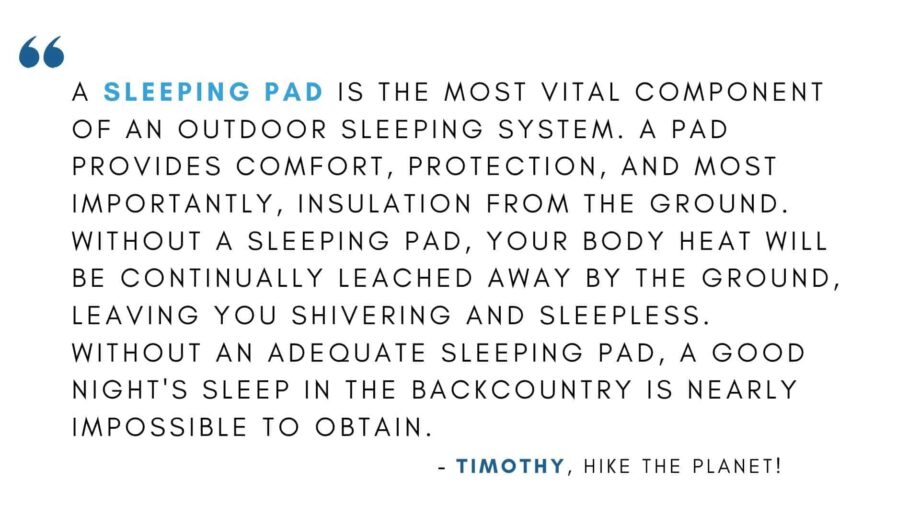
- RV mattresses: If you have an RV or camper, you can up your comfort game by getting an RV mattress. These are like the bed mattresses you have at home but are specially designed to fit smaller, lower-profile sleep spaces inside RVs and campers. Most contain foam, which is known for its comfort and ability to relieve pressure points at the shoulders and hips. Some use innerspring for added support. Others, like latex, are naturally cooling to keep you comfortable throughout the night.
- Camping pillows: There’s no need to ball up clothes to use as a pillow when you can get a specially designed camping pillow. These pillows provide comfort, but they also support your head and neck and prevent neck aches and headaches. Camping pillows tend to be lighter in weight and many can compress down to fit snugly in backpacks.
- Sleep mask: Want to keep the early morning sun from waking you too early? Consider packing a sleep mask. These small fabric eye masks work wonders at shielding the eyes from the morning sun.
- Comfortable PJs: What you wear to bed at home is not necessarily the best choice for your camping sleepwear. When camping, before going to bed, be sure to change out of all the clothes you were wearing during the day, including your underwear. Chances are you were doing some sweating, and a little bit of dampness will translate to a lot of discomforts when you’re bundled up in your sleeping bag. For colder nights, consider wearing thin thermal underwear, a fleece outer layer, and a beanie to keep your head warm.
- Nighttime bathroom kit: Even if you aren’t prone to middle-of-the-night bathroom breaks, set aside some things you might need for a nighttime trip to the latrine, such as a flashlight, shoes, a jacket, and, if necessary, toilet paper. It is useful to sleep with a flashlight right next to your pillow so that if you need to use the restroom in the middle of the night, you are not stumbling around in the dark. And, if possible, let someone know where you’re headed so they don’t wake up and wonder where you are. They can also check on you if you take too long to return.
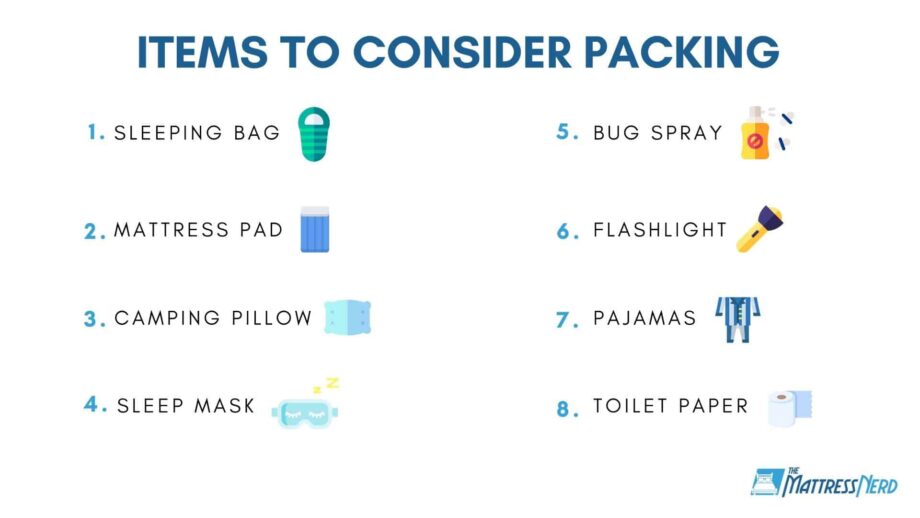
Know your Environment
Being in nature has countless benefits. But there’s plenty of stuff outdoors that can be disruptive to your good sleep. Let’s take a look at a few annoyances and how you can avoid the possible discomfort they cause:
Wildlife
When you camp in the wilderness, or even at an established campsite, you’re spending the night in the home of countless species of wildlife including raccoons, bears, or even Sasquatch. Here are some ways to stay safe during your camping excursion:
- Sleep in an RV, camper, or tent, and not out in the open
- Set your tent away from woods or trails. Be sure food is contained in a locked container
- Properly dispose of garbage. Avoid throwing food trash in your campfire as the smells and oils may attract unwanted wildlife even after you put the fire out
- Keep a flashlight handy when darkness falls
Bugs
When you camp, you’re sure to run into a few pesky insects, which can be especially bothersome at night. Mosquitos, flies, bees, spiders, and ants have a way of making themselves known. But there are ways you can keep them from interrupting your peaceful night’s sleep:
- Use DEET-containing bug repellant sprays or creams. If possible, look for waterproof varieties.
- Try homemade essential oils for a more natural approach, particularly those that contain thyme, eucalyptus, sage, rosemary, citronella, or basil.
- White or cider vinegar are natural bug repellents. Spray it on your skin or around your entire campsite.
- Light bug-repelling candles, such as those containing citronella, or diffusers that emit pesticides.
- Spread smelly bug-hating foods around your tents, such as onions, garlic, and citrus fruits.
- Keep your skin covered in clothing, especially during dusk and dawn when bugs are more active.
- Avoid fragrant body care products like lotions, deodorants, and shampoos.
- Keep your campsite clean and properly dispose of any garbage.
- Keep your tent zipped up at all times to keep pests out.
- Use bug screens or netting around your sleeping bag or tent.
Noise
The great outdoors is peaceful, but it’s also quite noisy. This can be disruptive at night when mosquitoes buzz, cicadas whir, and crickets chirp. Block out those noises with a set of earplugs. They’re also small and easy to pack!
Light
The sunrise is a wonder to behold. But if you’re hoping to sleep in, you might want to pack a sleep mask to block out the sunlight.
Temperature
Unless you’re glamping in an RV, you won’t be able to control the temperature around you. Being too hot or too cold can certainly disrupt your sleep.
- Cold weather camping: Be sure you have a sleeping bag with the proper temperature rating for the weather you’re camping in. Use an insulated mattress pad and dress for bed in a thin thermal base layer with a warmer fleece layer. Wear a hat to keep your head warm. Also set up camp next to boulders, if possible, to block chilling wind, and find a spot that gets ample daylight sun. Always remember to put out your fire completely before bedtime, especially if it’s windy.
- Warm weather camping: Again, be sure you have a sleeping bag that’s designed for warmer summer evenings, and wear thin, loose clothing to bed. Pitch your tent in the shade and, if possible, set up camp high on a bluff so you can take advantage of cooling breezes.
Follow a Routine
Just because you’re camping doesn’t mean you should skip your nighttime routine. Do the things you usually do 30 minutes before bed, like brush your teeth, visit the restroom, and read or meditate to wind down. Here are some other helpful hints to improve sleep while camping:
- Avoid stimulants. Substances such as caffeine and nicotine close to bedtime can prevent you from falling asleep.
- Avoid alcohol close to bedtime. Too much alcohol before bedtime can make you crash quickly, but it can also wake you in the middle of the night and keep you awake for hours. Late-night cocktails can have you waking up for late night bathroom breaks as well.
- Watch what you eat before bedtime. Campsite dinners are a pleasant break from the norm. But you don’t want to overindulge in too many s’mores or heavy foods before bedtime or you may be awakened with a nasty case of acid indigestion. Also avoid fried or fatty foods, spicy foods, citrus fruits, and carbonated beverages.
Conclusion
Science has proven that time in the great outdoors offers countless benefits for your general health and wellbeing. Spending the night outdoors can also improve your sleep by resetting your biological clock. However, sleeping outside isn’t necessarily as comfortable as sleeping in our own beds in our own bedrooms. But there are many ways you can make your camping excursion more comfortable and conducive to sleep. And, in turn, enjoy the vast benefits of a good night’s sleep.
